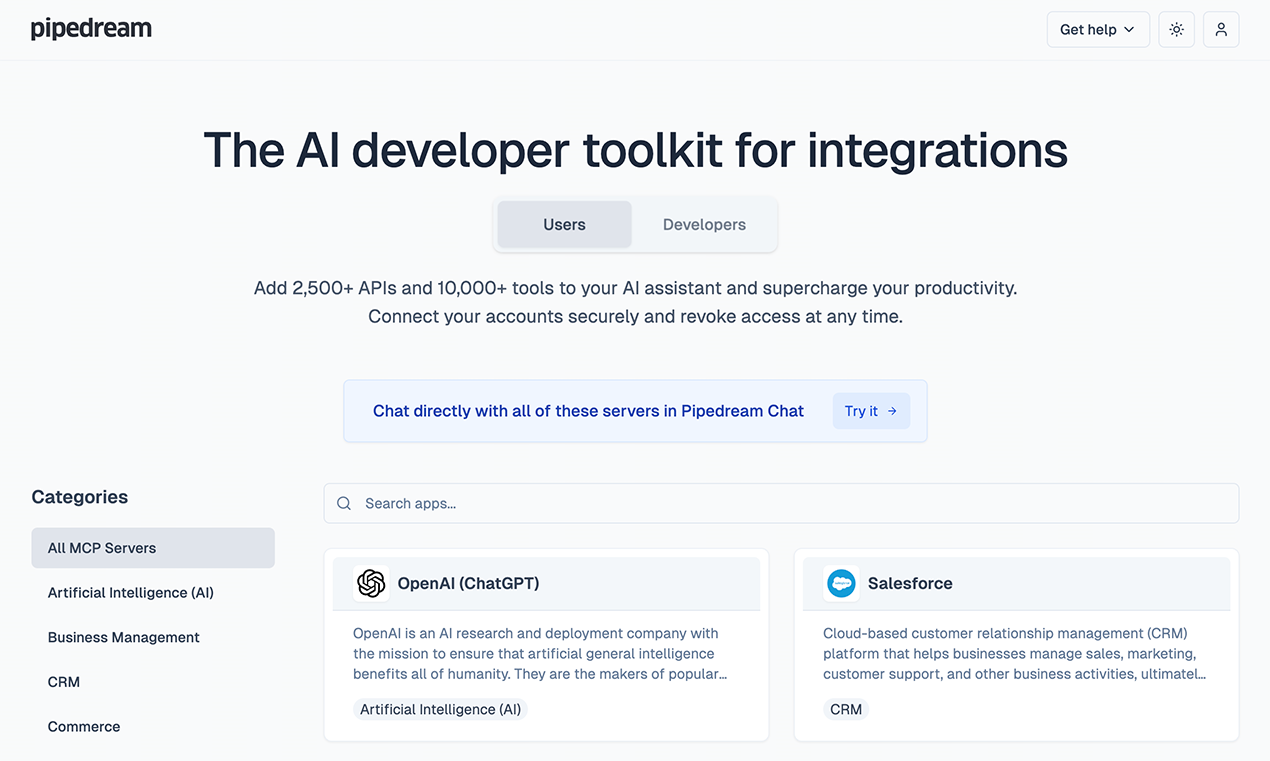
Table of Contents
Overview
In the rapidly evolving world of AI, connecting your favorite AI models to real-world applications is crucial for unlocking their full potential. Enter Pipedream MCP, a platform extension designed to bridge the gap between AI and the vast landscape of integrated apps. Pipedream MCP empowers AI models like Claude and Cursor to securely access over 2,500 integrated apps through a dedicated Model Context Protocol (MCP). Let’s dive into what makes Pipedream MCP a noteworthy tool for AI-driven automation.
Key Features
Pipedream MCP boasts a range of features designed to facilitate secure and standardized API interactions for AI tools:
- Model Context Protocol (MCP): The core of Pipedream MCP, providing a secure and standardized protocol for AI models to interact with external applications.
- Secure API Access: Ensures that AI models can access APIs in a secure and controlled environment, mitigating potential security risks.
- 2,500+ App Integrations: Offers a wide array of integrations with popular apps and services, enabling diverse automation possibilities.
- Supports AI Assistants: Specifically designed to work seamlessly with AI assistants like Claude and Cursor, extending their capabilities.
- Standardized Protocol: Provides a consistent and reliable framework for AI models to interact with different APIs.
How It Works
The magic of Pipedream MCP lies in its ability to create a secure and controlled environment for AI interactions. AI assistants, such as Claude, connect to external applications through the Model Context Protocol (MCP). Pipedream manages the backend infrastructure and security layers, ensuring that only authorized interactions occur across the integrated services. This approach eliminates the need for AI models to directly handle API keys and authentication, significantly reducing security vulnerabilities. In essence, Pipedream MCP acts as a secure intermediary, facilitating seamless and safe communication between AI and the outside world.
Use Cases
Pipedream MCP unlocks a multitude of possibilities for AI-driven automation and integration:
- AI-driven Automation: Automate complex tasks by connecting AI models to various applications, streamlining workflows and improving efficiency.
- Secure Data Retrieval: Enable AI models to securely retrieve data from different sources, empowering them to make informed decisions.
- Multi-app Workflows: Create sophisticated workflows that span multiple applications, orchestrating complex processes with ease.
- Assistant-enabled Operations: Empower AI assistants to perform tasks and interact with applications on behalf of users, enhancing their utility.
- API Orchestration: Simplify the process of managing and orchestrating APIs, making it easier to integrate AI models with existing systems.
Pros & Cons
Like any tool, Pipedream MCP has its strengths and weaknesses. Let’s examine the advantages and disadvantages.
Advantages
- Broad API Coverage: Access to over 2,500 app integrations provides extensive possibilities for connecting AI models to various services.
- Strong Security Focus: The Model Context Protocol (MCP) and secure API access prioritize data security and prevent unauthorized access.
- Standardized Access for AI: The standardized protocol simplifies the integration process and ensures consistent interactions across different applications.
Disadvantages
- Technical Setup Needed: Implementing Pipedream MCP may require some technical expertise to configure and integrate with existing systems.
- Dependent on Pipedream Infrastructure: The functionality of Pipedream MCP relies on the availability and stability of the Pipedream platform.
How Does It Compare?
When evaluating Pipedream MCP, it’s important to consider its competitors. Zapier NLA offers broader brand visibility and a more user-friendly interface for general automation tasks. On the other hand, LangChain Tools is more developer-focused, providing a wider range of tools and libraries for building custom AI applications. Pipedream MCP carves its niche by focusing on secure and standardized API access for AI models, offering a balance between ease of use and robust security features.
Final Thoughts
Pipedream MCP is a powerful platform extension that empowers AI models to interact with the real world in a secure and standardized manner. While it may require some technical setup, the benefits of broad API coverage and strong security make it a compelling choice for organizations looking to leverage AI for automation and integration. If you’re seeking a secure and reliable way to connect your AI models to a wide range of applications, Pipedream MCP is definitely worth considering.

